Linux is a Unix-like operating system that is open source software—which makes Linux free for everyone to download and install. The freedoms of the Linux kernel don’t stop there either; you will continue to use the operating system on your computer for free without needing to make a payment for anything to do with the operating system itself.
Linux is a word for the overall operating system, but many Linux distributions include more specific versions of the operating system. All of them remain open source and free to install and use, plus a unique person is the founder of each distribution. (By the way, those founders typically end up being rich anyhow so there is no need to feel sorry for them). The fact that they do end up wealthy though is just another reason for you to love open source software: you use it for free, and they end up rich still anyhow—just not quite as wealthy as Bill Gates is all.

There are a large number of Linux distributions that people use that still classify them as running Linux operating systems. Some of those include Ubuntu, OpenSUSE, Arch Linux, elementary OS, Solus, Chrome OS, Debian, Linux Mint Debian Edition, Knoppix, Finnix, Emdebian Grip, CrunchBang Linux, Raspbian, Sunwah Linux, SalineOS, Webconverger, Xanadu, plus much more still. All up there are currently fifty Linux distributions for you to choose. You can read up on the full list of Linus distributions, Ubuntu-based distributions, Knoppix-based distributions, old official distributions, as well as third-party distributions from the Wikipedia page.
Many businesses choose to run Linux operating systems over Windows operating systems. Though the list of companies is much smaller, often the job positions earn more money. There are a few reasons for this: 1. It takes lots of work to get good enough at knowing Linux to call you a Linux expert 2. The amount of professionals in the Linux field is far fewer than Windows and therefore there are fewer people who can do the job and thus raise the price of your worth and 3. People who you are working for are less likely to be experienced Linux users compared to Windows users.
Linux can be installed already when you buy a laptop or computer from the store. Up until recently, often the price of the unit was a bit lower because Linux is free and the others not made by Apple will be running Windows. However, we are now witnessing many free upgrades to the current version of Windows (possibly aimed at taking away that advantage to Linux buyers). The other way users can run Linux is by partitioning the hard drive and installing Linux on your existing computer that is running on another operating system such as Windows. Doing that then gives you the chance to either boot Windows or boot Linux when you feel like it. Having two unique operating systems on separate partitions is going to require considerable space on the computer which is why that’s not an attractive option for many users. Most users who have bought computers in recent years should find ample space to get the job done though if they want to do it.
There are numerous ways you can start using Linux, and just like your other learning in real life, there is no right or wrong method for doing it. Some people learn best in a classroom environment, and those people might be best to study Linux courses just like Windows offers courses for people to become Windows experts. Other people might be better off installing Linux and starting to use it themselves and then follow material online and learn how to do things they need to do. Anyone wanting to get a job that involves being a Linux expert such as a Linux system administrators should look for courses to study Linux because you’ll need the certificates to be employable plus the courses will give you the exact knowledge one needs to be successful in the job. A word of warning when studying courses: if you choose to study at private companies, you might not want to that directly after a GFC such as what I did, or it might go bust and that two pages of fine print you skipped through probably says something along the lines of if we go bust we keep your money.
One of the great things about Linux distributions is that each distro is good at something different, so the diversification of the operating systems is about as grand as you’ll find. Windows operating systems tackle this issue slightly different where they have a version of Windows 10 Home, Windows 10 Pro and so forth and each has different features for personal use or business use. The diversification of Linux allows you to check our various distributions instead. I know that my web hosting uses RPM Linux for example, and that’s beneficial for something to do with servers. However, up until knowing about my web server, I didn’t even know that RPM Linux existed.
If you are looking for distributions to use that has a bit of everything I recommend checking out Ubuntu. The Ubuntu is based on Debian, and it has twelve different Ubuntu distributions, including Ubuntu GNOME, Ubuntu TV, Ubuntu Server and heaps more packages they are useful for various things.